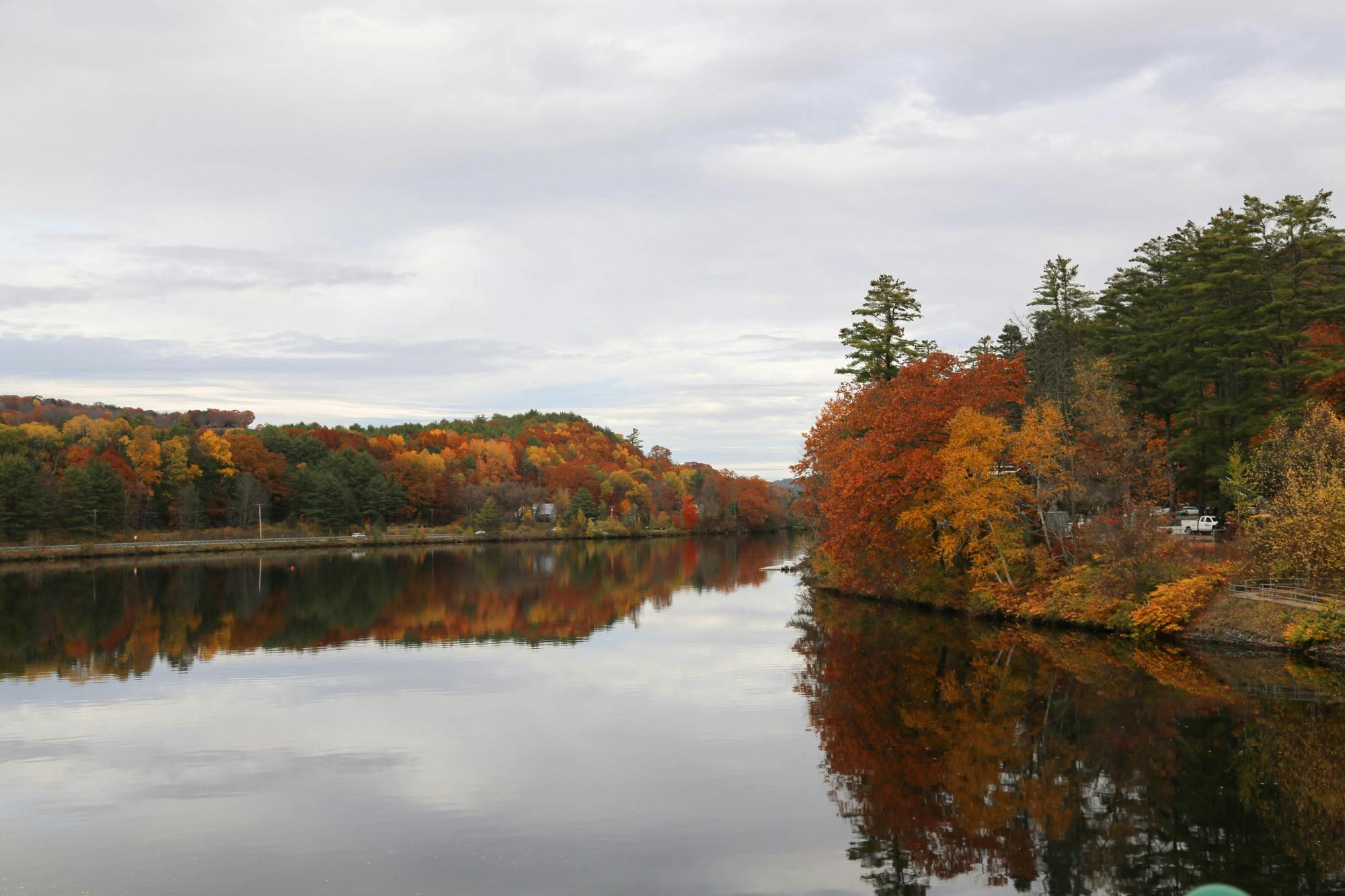This article is featured in the 2024 Green Key special issue.
On May 4, I trekked across campus with my friends Margaret “Maggie” de la Fuente ’27 and Avery Stern ’27 to the Ledyard Canoe Club’s clubhouse, a quaint building located just a few feet from the Connecticut River. Excited by the prospect of being outside for one of the first sunny Saturdays of the spring term, we rented a canoe and made our way over to the docks.
Ledyard Canoe Club, often referred to as just Ledyard, is one of 23 sub-organizations of the Dartmouth Outing Club. College students and community members alike can either purchase a year-long Ledyard membership or rent a canoe for an hourly fee during the open season, which begins in the spring, when the water temperature reaches 50 degrees Fahrenheit. The season ends in the fall, when the water temperature drops below the 50 degree threshold — or when business “doesn’t really run anymore,” according to junior business manager Aksel Paul ’27 and senior business manager Owen Duncan ’26.
As business managers, Paul and Duncan are responsible for Ledyard’s finances. Ledyard is the only financially-independent DOC sub-organization, Duncan said. According to the collection “Ledyard Canoe Club: A History of Exploration and Adventure” at the Rauner Special Collections Library, Ledyard’s financial autonomy has a long history. Ledyard was founded as an independent non-profit organization in 1920 and did not become an official College organization until 1977, according to the collection.
Paul said he became involved with Ledyard after one of his close friends, who is a “huge kayaker,” encouraged him to sign up for a DOC trip. During his excursion, Paul said he “completely fell in love” with the DOC and began attending “feeds” — meals with other Ledyard members — and weekly Ledyard council meetings soon after.
“[Joining Ledyard] has been probably one of the best decisions I’ve made since coming to Dartmouth,” Paul said. “[The Connecticut River] is my favorite place on campus.”
In contrast, Duncan said he “grew up doing a lot of outdoorsy activities,” which have “always been huge for [him].” During his freshman winter, Duncan applied to be junior business manager because it combined his interest in the outdoors with “an awesome business experience.”
“It’s the best job on campus,” Duncan said.
Paul and Duncan said they are currently working with the College to renovate the Ledyard clubhouse, which serves as the headquarters for its canoe rental business and occasional social events. The upstairs floor of the clubhouse, which used to provide student housing for the business managers, has since been “condemned” due to asbestos concerns. There is also “pretty severe” erosion along the river bank, according to Duncan.
“The retaining wall has probably moved a foot in the last year,” he said. “I can see it move on a month-by-month basis.”
Duncan added that he had to “dig a trench” in the nearby parking lot last summer to prevent the clubhouse from flooding during rain storms. This summer, Paul will be working full-time as junior business manager.
Duncan and Paul also said they “really do not like” that Ledyard is a “price-exclusive” organization, since there are fees associated with renting equipment. Currently, “all of the [revenue]” that Ledyard brings in “goes toward the club and staff wages,” Paul said.
“A primary priority is improving the student experience by having accessibility to canoes and kayaks [and] being able to provide a venue for events,” he explained.
According to Duncan, the College paid boat rental employees’ wages during the COVID-19 pandemic — “the only time in the Ledyard business’s history” — which allowed Ledyard to offer access to boats for free.
“To encourage people to get outside, all boat rentals were free for students for a short time because there were no staffing costs,” he explained.
Duncan added that the club is “trying to move in a direction” to provide free boat rentals “soon.”
As Maggie, Avery and I paddled up the river, we couldn’t help but talk about the beauty of the views: the still water, freshly-green trees and comically puffy clouds all painted a picture perfect day. Even our close encounter with two boats from the men’s rowing team — no further elaboration on that — can be viewed through the lens of the gorgeous spring day, grounding us in our NARP-ness.
Our hour-long canoe trip may not seem like much, but it was a peaceful intermission to what the three of us agree have been harrowing academic experiences. Same time next week?




